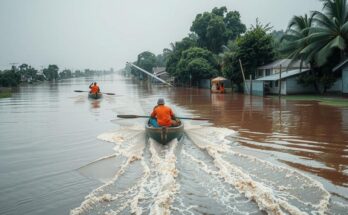The article discusses the urgent need to address the impacts of climate change and armed conflict on children, as highlighted by a recent UN report. At the COP29 conference, calls increased for integrating children’s perspectives into climate and security discussions. Notable statistics reveal that nearly 1 billion children live in high-risk, conflict-affected areas, stressing the necessity for inclusive humanitarian strategies and increased funding to support these vulnerable populations.
As global conflicts persist, the importance of addressing the intersecting crises of climate change and armed conflict on children cannot be overlooked. A 2023 study established a critical link between climate insecurity and human rights violations against children in war zones, revealing that children are disproportionately vulnerable to the combined effects of climate and conflict-related challenges. In light of these findings, a strong advocacy movement is emerging, calling for the integration of climate and children’s rights perspectives in conflict resolutions. During the recent UN climate conference (COP29) in Baku, Azerbaijan, this advocacy gained further traction. The Special Representative of the UN Secretary-General for Children and Armed Conflict, Virginia Gamba, underscored the necessity for the effective inclusion of children affected by these crises in discussions about climate change and global security. “From the Lake Chad Basin to Syria… children have been the most impacted by both armed conflict and climate insecurity,” emphasized Gamba, illustrating the urgency of this issue. The challenging intersection of climate change and armed conflict is starkly evidenced by data from UNICEF, indicating that nearly one billion children live in regions severely affected by both climate conditions and conflict-related displacements. Additionally, a collaborative report by the International Organization for Migration (IOM) and UNICEF outlines guiding principles emphasizing the protection of children displaced by these dual crises, highlighting the obstacles that humanitarian actors face in delivering aid. The Special Representative’s plea for increased funding and flexible financial contributions to address the unique needs of children in crisis situations reinforces the necessity for a dual-focus humanitarian response. With ongoing challenges in securing adequate resources, the call to enhance funding aimed at both climate resilience and conflict prevention is crucial for achieving sustainable solutions. As conversations around climate, peace, and security evolve, it remains imperative that children affected by armed conflict are included in the dialogue to forge comprehensive, equitable solutions.
The article highlights the escalating hardships faced by children amidst the intertwining crises of climate change and armed conflict. It references a 2023 report by the UN Secretary-General’s representative, which underscored the grave violations against children resulting from climate-related conflicts. As communities globally confront the adverse effects of both climate disruption and warfare, proactive strategies to safeguard children must be prioritized by world leaders and policymakers. The 2024 UN climate conference in Baku served as a crucial platform for these discussions, bringing attention to the need for collaborative approaches that recognize and mitigate the risks children face in conflict zones worsened by climate change.
In conclusion, the intersection of climate change and armed conflict significantly exacerbates vulnerabilities for children worldwide. The urgent need for inclusive discussions that prioritize children’s rights and experiences in climate and security frameworks is evident. By incorporating these perspectives, humanitarian efforts can be more effective and sustainable, ultimately leading to better outcomes for the most affected populations.
Original Source: www.ipsnews.net




